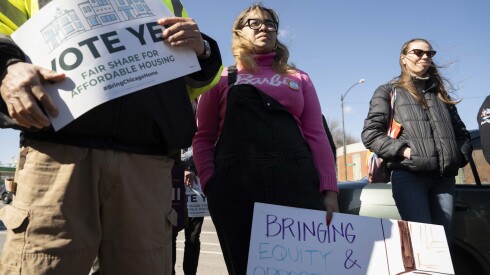Bring 'Bring Chicago Home' back on the ballot, with a few changes
- Get link
- X
- Other Apps

Supporters of the Bring Chicago Home referendum at a “March to the Polls” rally earlier this month.
Pat Nabong/Sun-Times
I voted for the Bring Chicago Home proposition on Tuesday’s ballot, but I wasn’t surprised that it lost. I encourage Mayor Brandon Johnson to try again with revisions.
The problem with the measure, as I see it, is that it did not differentiate between commercial and residential sales and especially did not differentiate between the sale of single-family homes and multi-family homes. It’s one thing to consider $1 million-plus single-family home sales as high-end, but an entirely different classification of multi-family or commercial properties at the same dollar amount.
Definitely, adding to the costs of multi-family rental properties was going to affect rents — and therefore affordable housing — more than it was going to burden the "mansion-owning" class.
SEND LETTERS TO: letters@suntimes.com. To be considered for publication, letters must include your full name, your neighborhood or hometown and a phone number for verification purposes. Letters should be a maximum of approximately 375 words.
Another problem with the discussion of the proposition was not differentiating between annual property taxes, which affect all property owners, and the transfer tax, which is only levied on real estate sales. Most property owners who don’t buy and sell frequently wouldn't have been affected at all.
The measure would have affected "flippers" — who buy low and turn around and sell high, without holding the property very long — more than anyone. From my point of view as a former rehabbing landlord (in a city other than Chicago), that wouldn’t be a bad thing, to tax high turnover sales. But it would also have added another burden to rehab developers who buy run-down properties, rehab them and then sell for a higher price.
A better plan would be to apply the transfer tax increase to sales of single-family homes worth more than $1 million and multi-family buildings at two or three times that amount. And treat commercial real estate in a far different manner. That might not raise as much money, but it would be a more workable tax increase.
Virginia Gilbert, Andersonville
Carbon capture and storage is the way to go
The demand for sustainable products is growing rapidly and Illinois must be able to compete. Many of the industries that have historically dominated the state and the broader Midwest — from heavy industry to agriculture — are difficult or impossible to fuel using renewable energy sources like wind and solar alone.
Reducing the emissions from these industries without phasing them out is critically important to meet the challenge of climate change while preserving millions of well-paying jobs. Carbon capture and storage (CCS) technologies can help do exactly that.
Using CCS, carbon dioxide can be captured at the source before it enters the atmosphere and then safely and permanently stored deep underground in Central Illinois, where the local geology is uniquely well-suited to safe carbon storage on a significant scale.
This can be a historic opportunity for the entire state to become a global hub for a proven technology that is rapidly being adopted. CCS can preserve jobs already here in the Midwest and create thousands of new ones, while helping Illinois companies compete with more sustainable products. A study by the University of Illinois Prairie Research Institute predicts that CCS could create more than 14,000 jobs here in Illinois.
CCS has already been used safely in Illinois for more than a decade.
Private sector investors have already laid out plans to invest billions into downstate communities, but these investments depend on the state enacting much-needed legislation that provides clarity to investors, encourages community input, and establishes a clear and reasonable regulatory framework.
Environmentalists, unions and business associations have already lined up behind CCS as a transformative opportunity. . Now, it falls to the Legislature to act. .
Christopher Cuddy, senior vice president, ADM; president, ADM Carbohydrate Solutions business unit
from Chicago Sun-Times - All https://ift.tt/Ysjh4pR
- Get link
- X
- Other Apps
Comments
Post a Comment